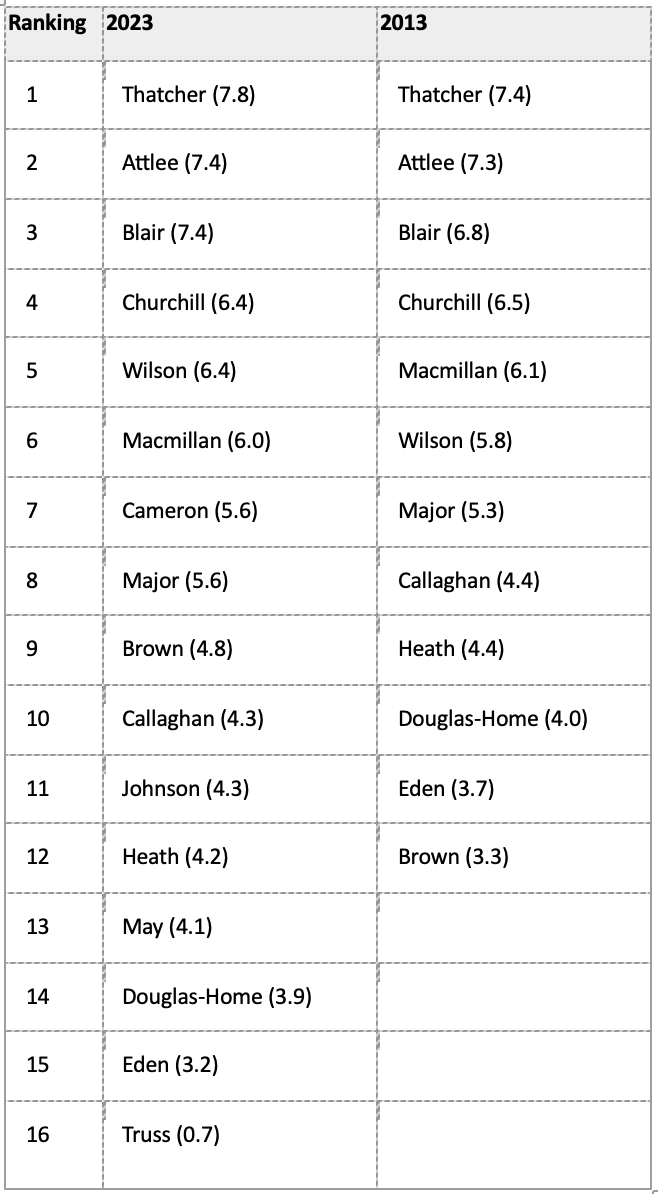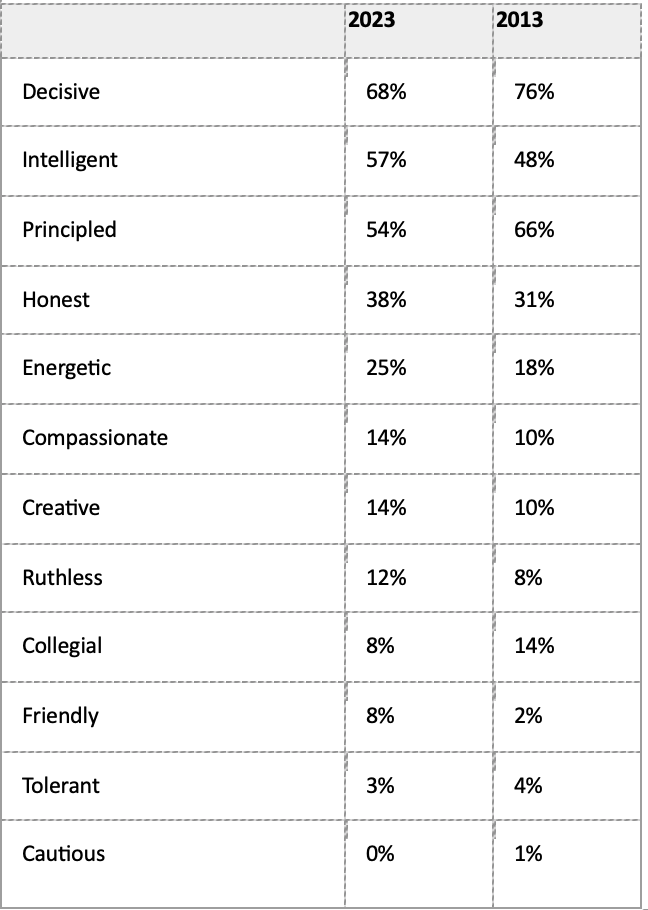| 7 mins read
There have been various attempts to rank UK prime ministers by their performance in office. Yet, no league table can be a definitive ranking of prime ministerial performance. There will always be new names to add, while past leaders’ reputations will tend to evolve. However, such rankings encourage us to consider to what extent individuals or circumstances make history, while the study of others’ evaluations sheds light on their conventional wisdoms and biases. MPs are an important group in this regard. They are usually immersed in their parties’ histories and traditions and spend much of their time observing and judging other politicians.
The Royal Holloway surveys
In 2013, a group of staff and students at Royal Holloway carried out a study of MPs’ evaluations of postwar prime ministers. The group sent an anonymous mail-back survey to all 650 MPs that elicited a response rate of 24 per cent. The questionnaire included a question that asked respondents to score each prime minister on a scale of 0–10, where 0 meant ‘highly unsuccessful’ and 10 meant ‘highly successful’. The prime ministers covered in the 2013 survey included all those from Attlee to Brown. Cameron was excluded because his premiership was ongoing.
A decade later, a new group at Royal Holloway conducted a follow-up survey that sought to measure how MPs rated Cameron, May, Johnson and Truss, and to investigate possible changes in how they rated earlier prime ministers. A mail-back questionnaire was again sent to all MPs, and it again asked MPs to score each prime minister on the same 0–10 scale. Rishi Sunak, as the incumbent, was excluded.
The 2023 scores and rankings

Table 1. The profile of respondents and all MPs (May 2023)
There is high degree of continuity in prime ministers’ scores and rankings between 2013 and 2023. Thatcher, Attlee, Blair and Churchill held the top four positions in both years. The main changes in the rankings were the additions of Cameron, Johnson, May and Truss, who, apart from Cameron, congregated towards the bottom of the table, whilst Brown jumped from last place in 2013 to ninth in 2023.
Two relatively objective ‘facts’ of each premiership seem to be reflected in the 2023 (and 2013) scores. The first of these is prime ministers’ records in winning general elections. MPs tended to score more highly election winners, though neither Attlee’s three defeats (in 1935, 1951 and 1955), nor Churchill’s two defeats (in 1945 and 1950) greatly diminished their standing in MPs’ eyes.
The second objective fact of each premiership reflected in the scores is length of tenure: MPs tended to score longer-serving prime ministers more highly. Indeed, the top eight prime ministers in 2023 served, on average, for seven years and 356 days, whereas the bottom-eight served, on average, for just two years and 124 days.
Finally, both factors were a precondition for something else that likely affected MPs’ scores: what prime ministers did in office. Thatcher, Attlee and Blair all served for at least six years and happened to have the highest scores in both 2023 and 2013, a reflection of their major impact since 1945.
Party loyalties and Brexit
Party loyalty made a difference in both surveys. Labour and Conservative prime ministers received higher scores from their respective parties. However, in 2023, Brexit was also significant for the thirty-one Conservatives MPs who returned the questionnaire. Overall, Leavers were more partisan than Remainers: their mean scores for Labour prime ministers were notably lower than Remainers’ corresponding scores. When it came to Conservative prime ministers, Leavers’ scores were significantly lower than Remainers’ scores for Macmillan (-1.4), Heath (-2.6) and Major (-2.2), all of whom deepened. EU relations.
Prime ministerial character

Table 2. Which character traits are most important? (% agreeing)
In addition to asking MPs to score each prime minister, the 2023 survey also repeated an item from 2013 that asked MPs to select the three most important character traits from among a list of twelve that they thought were necessary for a prime minister to be successful.
MPs in 2023, as in 2013, tended to select ‘decisive’, ‘intelligent’ and ‘principled’ as being among the three most important. There were statistically significant differences when responses were cross tabulated by party. 81 per cent of Conservatives chose ‘intelligent’, compared with 37 per cent of Labour MPs and 33 per cent of other MPs. More broadly, the two most important traits among MPs from other parties were ‘principled’ and ‘honest’. It may be that the expectation or experience of being in government conditioned Conservative and Labour MPs to emphasise competence over honesty. It may also be that the relatively limited importance attached to ‘principled’ among Conservative and Labour MPs is indicative of a ‘Truss effect’ and ‘Corbyn effect’ respectively. Principles matter but holding the wrong principles can make leaders appear dogmatic.
MPs’ rankings in context
MPs’ evaluations of prime ministerial reflect important insights gleaned from working in politics, as well as their party loyalties. However, they are not necessarily more authoritative than those based on others’ judgements.
In the case of academic opinion, a 2021 survey of academics, as with MPs, tended to score longer-serving prime ministers more highly, though the heavily Labour-leaning sample of academics tended to score Brown more highly than MPs, and Churchill and Cameron more critically. Similarly, in a 2021 Ipsos poll, the public ranked prime ministers comparable to those in the 2023 parliamentary rankings. Only Attlee’s and Churchill’s positions differed by more than two places. This discrepancy is probably a reflection of Churchill’s almost mythical status.
It remains to be seen how prime ministers’ historical reputations evolve, but those who aspire to the highest political office must be prepared for critical and unvarnished evaluation. The conventional wisdoms surrounding prime ministers— whether those of politicians, academics or citizens—may be wrong or misguided, yet prime ministers themselves have more opportunity than most to shape how others view them. If they end up being widely viewed as incompetent, dishonest or deficient in other ways, ‘them’s the breaks’.
Need help using Wiley? Click here for help using Wiley







